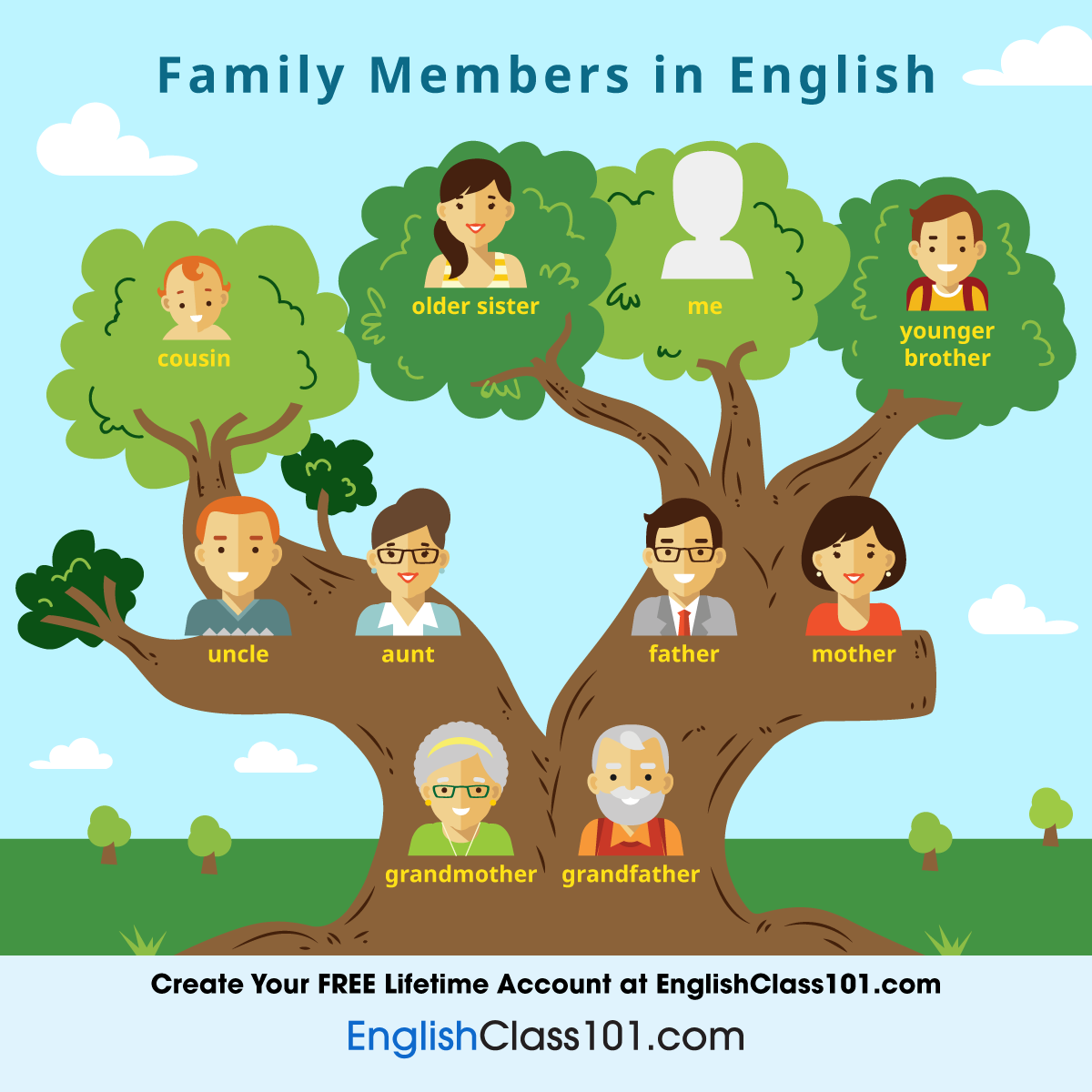Studying how to describe family is important because family are the closest people to you, and in some ways they can even be considered an extension of yourself. It’s likely you’ll want to talk about your family at least a little while in the United States, and even more likely that you’ll be asked questions about your family as you start to make friends. By studying family descriptors in English, you’re preparing yourself for this.
So, let’s get started! Learn some important family vocabulary for American English family members with EnglishClass101.com!
Table of Contents
- Family in American English
- Family Member Terms and Basic Phrases to Use
- American English Immediate Family & American English Extended Family
- Family Terms for Married People
- Endearment Terms
- Common Family Proverbs
- Conclusion
1. Family in American English
As with anywhere in the world, the concept of family in the United States has its own set of characteristics and expectations. So before we delve into the actual vocabulary for family, let’s go over a few unique facets of the American English family that may be helpful to know.
1- Is Family a Strong Institution in the United States?
On some level, family is a strong institution in the United States, though it seems to be decreasing in importance. While most people do love and care about their family members, it’s certainly common to like some of them more than others. Furthermore, as an individualistic country, it’s becoming more common to cut people who are “toxic” out of your life, making family bonds somewhat conditional.
That said, there are many who still consider family to be the most important thing, and the concept of family being there for each other no matter what is still common.
2- Does Age Difference Count?
This question is up for debate in the United States.
There are some people who believe age difference always matters, and those who are younger must always respect those who are older. For example, when it comes to parents and children, many traditional or conversative families strongly believe that children must respect their parents.
However, there’s also an increasingly common concept of age not mattering too much. While it’s thought by most people that young children should be under their parents’ or guardians’ control/protection, some also believe that children should have equal or near-equal respect as adults. Furthermore, it’s becoming more and more common for children to disrespect their elders (though this is usually frowned-upon).
Usually, when it comes to adults in the family, age isn’t considered too great a factor overall.
3- Other Factors to Consider
Friends are commonly referred to as being like family, and it’s common for people to refer to people as “father-figures” or “mother-figures” in a country where single-parenting is quite common. Also, people often think of their pets as members of the family.
2. Family Member Terms and Basic Phrases to Use
Now that you have a better idea of how family in the United States is, let’s take a look at basic words to describe a family member’s relationship to you. As you learn about family, English vocabulary like that below is essential to have stored in your memory. Keep in mind that in the United States, anyone who’s related to you is called your “relative.”
Without further ado, here’s a list of basic English language family member terms you should know, including “son” in English. Later, we’ll go into more detail on family vocabulary in English; this just to give you an idea of how to say members of the family in English.
1- List of Family Member Names:
- Mother
- Father
- Parents
- Brother
- Sister
- Son
- Daughter
- Grandson
- Granddaughter
- Grandparents
- Grandmother
- Grandfather
- Great-grandmother
- Great-grandfather
- Uncle
- Aunt
- Great-uncle
- Great-aunt
- Nephew
- Niece
2- Phrases to Use
Chances are, you’ll find yourself wanting to talk about your family while you’re in the United States. (If not, you’ll probably need to talk about them a little bit anyway if people ask questions.) Here are a few basic phrases you can use to describe your family and your relationship with them. Hopefully this will also help you learn some family-related words in English!
- “I have a [family member].” or “I have ___ [family members].”
This phrase states the fact that you have a specific family member. For example, you could say: “I have a sister.”
Or, if you have more than one sister, you could say: “I have three sisters.”
Further, you can compound this sentence to say that you have two different types of family members. For example, you could say: “I have a sister and a brother.”
- “My [family member] is ___ [adjective].”
Use this phrase to describe directly how a certain family member is. This can be used in two basic contexts.
The first is when someone asks you, “How’s your brother (or sister, or father, etc.) doing?” To this you could respond, “My brother is doing well.”
The second context is when you’re simply describing these family members to someone. In this instance, you could say something like, “My mother is a perfectionist,” or “My uncle is funny.”
This helps people get a better idea of the family you grew up with.
- “I love my [family member or family members].”
Use this phrase to express affection or love for one or more of your family members. When talking to someone about your family, you may say something like, “I love my mother,” or “I love my siblings.”
Further, you could generalize this sentence to simply say, “I love my family.”
- “My [family member]’s name is ___.”
Depending on who you’re talking with and how much you want to tell them about your family, you could also include what their names are.
For example, you could say, “My great grandmother’s name is Maria,” or “My brother’s name is Tyler.”
Of course, if you’re not comfortable sharing your family members’ names or simply don’t get the opportunity to, there’s no problem with that at all.
- “My [family member] is ___ [age].”
You can use this phrase to describe your family members’ ages. For example, if you’re talking about your cute little sister, you could say, “My little sister is seven. She’s so cute!”
- “I’m the oldest/youngest/middle child of ___ kids/siblings.”
This phrase is a little bit more complex. But let’s say that after talking about your little sister, the person you’re talking with wants to know how many siblings you have and whether they’re older or younger.
You could incorporate the first phrase we went over with this new phrase to answer their question (with slight alterations), or simply use this newer phrase alone. Here’s an example conversation if you were to include the first phrase:
You: “My little sister is seven. She’s so cute!”
Friend: “Aw! How many siblings do you have? Are they all younger?”
You: “I have two siblings. I’m the middle child.”Or, to simply use this phrase alone:
You: “I’m the middle child of three kids.”
- “My [family member] and I don’t get along very well.”
Maybe there’s a family member you don’t quite get along with (we all have at least one!). If this happens to come up in a conversation, you could say something along the lines of, “My mother and I don’t get along very well,” and then maybe go into some more detail if you feel comfortable with the person you’re talking to.
- “Do you want to meet my [family member] (or simply family)?”
You probably shouldn’t use this phrase when meeting someone for the first time, as it can seem too forward (or even creepy) to invite someone to meet your family so soon. An invitation like this should wait until after a few meetings and until a closer relationship has been formed with this person.
Once this has been established, there’s usually no problem inviting someone to meet your family. It can even be seen as a polite gesture and there’s a chance that you’ll one day get invited to meet their family too.
Here’s an example conversation using this phrase:
You: “My children are coming to visit this weekend. Do you want to meet my family?”
Friend: “Sure. What time should I come over? I’ll bring something to eat.” - “I miss my [family member] (or simply family).”
Homesickness: Some people are more prone to it than others, but we all miss one family member or another at some point. You can use this phrase to express this to someone.
For example, maybe you’ve just been talking about your grandmother; her sweet nature, how excellent her cooking is, all the dice games you’d play… you’re about to tear up right now. You could say, “I miss my grandmother,” to express how you’re feeling.
- “My [family member] is a ___ (job title)” or “My [family member] does ___ for a living.”
If you want to be a little offbeat in your family conversation (or if it just happens to come up), you can talk about what a family member does for a living. Here are some family expressions in English using both of the options above.
- “My mother is an accountant.”
- “My son does carpentry for a living.”
- “My aunt is a teacher.”
- “My cousin does restaurant critiquing for a living.”
3. American English Immediate Family & American English Extended Family
Near the beginning of this article, we went over various names for family members. Now, we’ll go into a little more detail about how each of these relatives are related to you. Consider this list of family members in English a sort of English word family dictionary.
1- Basic Terms
- Mother Meaning: Your “mother” is your female parent.
- Father Meaning: Your “father” is your male parent.
- Grandfather Meaning: Your “grandfather” is your mother or father’s father.
- Grandmother Meaning: Your “grandmother” is your mother or father’s mother.
- Son Meaning: Your “son” is your male child.
- Daughter Meaning: Your “daughter” is your female child.
- Grandson Meaning: Your “grandson” is your son or daughter’s male child.
- Granddaughter Meaning: Your “granddaughter” is your son or daughter’s female child.
- Brother Meaning: Your “brother” is your male sibling.
- Sister Meaning: Your “sister” is your female sibling.
- Uncle Meaning: Your “uncle” is your mother or father’s brother.
- Aunt Meaning: Your “aunt” is your mother or father’s sister.
- Cousin Meaning: Your “cousin” is the child of an uncle or aunt.
- Niece Meaning: Your “niece” is your brother or sister’s female child.
- Nephew Meaning: Your “nephew” is your brother or sister’s male child.
2- Additional Notes
There’s a common phrase relating to family members that may be helpful for you to know: “On my father’s/mother’s side.”
In truth, it may be a rare occasion that you actually use this phrase, but it’s used frequently enough in the United States that it’s good to know.
This phrase simply indicates which “side” of your family a relative you’re talking about is on. For example, when you’re talking about a favorite aunt, the person you’re talking to may not know whether you mean your father’s or mother’s sister. But if you say, “My aunt on my mother’s side,” it becomes clear that you’re talking about your mother’s sister and not your father’s.
4. Family Terms for Married People
1- Basic Terms
When you get married, you gain not only your spouse but their whole family. Let’s go over some family terms for married people:
- Wife: Your “wife” is your female spouse.
- Husband: Your “husband” is your male spouse.
- Daughter: Your “daughter” is your female child.
- Son: Your “son” is your male child.
2- In-Laws
We mentioned that when you marry, you gain your spouse’s family. In the United States, there’s a special term we use for family members who are now yours through marriage to your spouse: “In-laws.”
Your spouse’s sister becomes your sister-in-law, their mother and father become your mother-in-law and father-in-law respectively, and so on.
3- Steps
Furthermore, in the United States it’s increasingly common for previously divorced individuals with children to marry. This is where “Steps” come in. “Steps” are family members who you’ve gained through a parent’s marriage rather than your own.
For example, let’s say your previously divorced mother gets remarried to a man who has a daughter. This man would now be your “stepfather,” and his daughter would be your “stepsister.” These are people who now are “related” to you through law after your mother remarried, but have no actual biological ties with you.
5. Endearment Terms
In the United States, they sometimes like to use “terms of endearment” for family members, especially those they are particularly fond of. While endearment terms can vary as much as people themselves, here are just a few of the most common for various family members (note that there are a lot of Grandmother synonyms!):
1- Basic
- Father: Dad, Daddy, Pa, Pop
- Mother: Mom, Mommy, Ma
- Brother: Bro
- Sister: Sis
- Grandfather: Grandpa, Granddad, Gramps, G-pa
- Grandmother: Grandma, Granny, Grams, Grammy, G-ma
- Aunt: Aunty, Auntie
- Uncle: Unc, Unk
- Cousin: Cous, Cuz
2- Spouse, Significant Other, or Other Close Family Member
- Dear
- Darling
- Sweetie
- Sugar
- Honey (or Hon)
Also, keep in mind that nicknames are a common form of endearment when referring to or talking with a family member. These nicknames can be just about anything.
6. Common Family Proverbs
In the United States, and around the world, proverbs about family are abundant. Here are just a few of the most common ones used in the United States, along with their basic meaning.
1- “Like father, like son.”
This proverb is one of the most common, and means that a person’s child tends to be a lot like them. This may be especially true of fathers and sons, and mothers and daughters. Genetics combined with careful observation of parents’ actions and attitudes make for children who largely resemble their parents in life.
2- “The apple doesn’t fall far from the tree.”
This proverb is similar to the one above, with essentially the same meaning. In this case, consider that an apple is the fruit of a tree, just as a child is the “fruit” of its parents.
This saying indicates that the “fruit,” will eventually fall (or in the case of children, grow up and leave home), but will still always resemble the type of tree (or parents) that grew (or raised) it. This phrase can be used to highlight a positive or negative quality.
3- “Family isn’t always blood.”
This saying essentially means that people other than blood relatives can be considered family. This is especially true in the United States, where people often consider close friends to be a part of their family despite lacking blood ties.
4- “Blood is thicker than water.” or “Blood of the covenant is thicker than the water of the womb.”
These two phrases, technically speaking, have two different meanings. However, the second one is less used and the first one is really just a shortened version of it.
“Blood is thicker than water,” indicates that blood family (or direct relatives) always come before anyone else.
On the other hand, “Blood of the covenant is thicker than the water of the womb,” indicates the opposite. In this phrase, the “water of the womb,” represents immediate family ties, while “blood of the covenant,” represents other ties (such as strong friendship or marriage).
Essentially, this one means that holding to a covenant, or promise, with someone who’s important to you is more important than loyalty to immediate family.
5- “You can’t choose your family.”
This is a favorite saying among family members all across the United States. “You can’t choose your family.”
This is an interesting phrase as it can have both a negative and positive connotation, depending on the context. Oftentimes, it’s both at the same time.
You don’t have any control over who your parents are, who your parents’ relatives are, or whether or not you have siblings. You just have to try and love them all; whether you like it or not, you’re stuck with the family you have. Make the most of it!
6- “Children are a poor man’s riches.”
This endearing phrase about family means that someone who has children is rich, despite their monetary value. It indicates that children are precious, and a person who has one has something very valuable.
7- “A house divided cannot stand.”
This proverb means that in order for a house (or family) to stand properly, it must be whole or united. Once divisions have occurred among family members in a household (be it arguments, jealousy, deceit, or anything else along these lines) that household is doomed to fall if it can’t reunite.
This emphasizes the impact that family has on daily life.
8- “Families are like fudge – mostly sweet with a few nuts.”
This is one of the more lighthearted family proverbs in the United States. If you’re not familiar with fudge, it’s a dessert commonly made in the United States, usually from chocolate, and often with nuts inside.
This phrase compares family to fudge. For the most part, family is “sweet”; it’s nice to be a part of a family and there’s really nothing like the love a family offers its members. But just like fudge, there’s always a few “nuts”—family members who are a little odd, quirky, or just not your favorite person.
But nuts or no, fudge is still a dessert to be enjoyed. 🙂
7. Conclusion
Now you have a better idea of how to talk about your family in English. This was a lot to go over, but it’s worth it for the sake of family, right? 😉
Visit us at EnglishClass101.com to continue learning English while having fun! We offer an array of insightful blog posts, free vocabulary lists, and an online community where you can discuss lessons with fellow English learners. You can also check out our MyTeacher program if you prefer a one-on-one learning experience with your own personal English teacher.
Your hard work in learning English will pay off, so study hard and get ready to reap the rewards. We wish you the best in your English-learning journey!

















